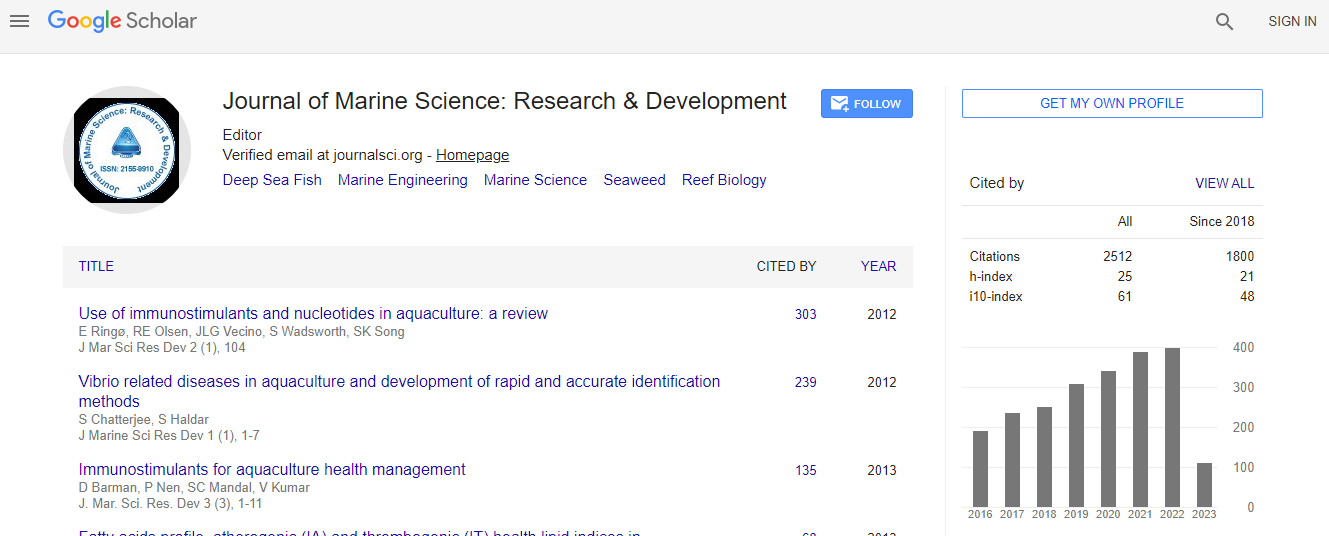Our Group organises 3000+ Global Conferenceseries Events every year across USA, Europe & Asia with support from 1000 more scientific Societies and Publishes 700+ Open Access Journals which contains over 50000 eminent personalities, reputed scientists as editorial board members.
Open Access Journals gaining more Readers and Citations
700 Journals and 15,000,000 Readers Each Journal is getting 25,000+ Readers
Google Scholar citation report
Citations : 3189
Indexed In
- CAS Source Index (CASSI)
- Index Copernicus
- Google Scholar
- Sherpa Romeo
- Open J Gate
- Genamics JournalSeek
- Academic Keys
- ResearchBible
- Ulrich's Periodicals Directory
- Electronic Journals Library
- RefSeek
- Directory of Research Journal Indexing (DRJI)
- Hamdard University
- EBSCO A-Z
- OCLC- WorldCat
- Scholarsteer
- SWB online catalog
- Virtual Library of Biology (vifabio)
- Publons
Useful Links
Recommended Journals
Related Subjects
Share This Page
Robyn Hannigan

Robyn Hannigan
Professor
Department of Environmental, Earth & Ocean Sciences
University of Massachusetts
USA
Tel: 02125-3393
Fax: 1-617-287-4857
Biography
Robyn E. Hannigan’s career in analytical geochemistry began at the College of New Jersey where she earned her B.S. in Biology in 1988. She completed her master’s in and doctoral degrees in Earth and Environmental Science at the University of Rochester focusing on high temperature trace element chemistry. During her post-doctoral fellowships at Woods Hole Oceanographic Institution and at Old Dominion University she leveraged her expertise in high temperature chemistry into collaborative research projects with biologists and oceanographers. Hannigan’s research has developed unique analytical techniques and technologies to evaluate the relation between biogenic mineral chemistry and the chemistry of the water and sediment in which these organisms live. In 2007, she received the American Chemical Society Medal for encouraging disadvantaged students into careers in the chemical sciences. She is a Fellow of the American Association for the Advancement of Science and Geological Society of America and an Aldo Leopold Leadership Fellow. Her research and student mentoring have been highlighted by SACNAS, AAAS, and the NSF. She is currently Professor and Chair of the Department of Environmental, Earth, and Ocean Sciences at the University of Massachusetts at Boston.
Research Interest
Marine and Estuarine Geochemistry, Biomineralogy, Saline lake geochemistry
Certificate
Global Speakers in the subject
Global Experts in the subject
Publications
Global Warming and Human Pollution as the Major Causes of Coral Bleaching
| Robyn Hannigan |
| : J Marine Sci Res Dev 2022, 12:321 |

 Spanish
Spanish  Chinese
Chinese  Russian
Russian  German
German  French
French  Japanese
Japanese  Portuguese
Portuguese  Hindi
Hindi 
